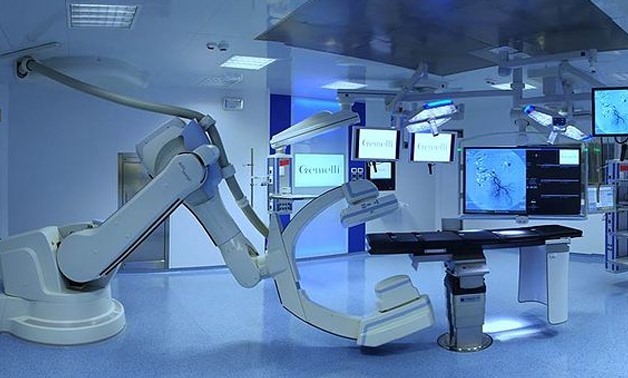
The amendments tightened penalties on human organ trading - Wikimedia Commons
CAIRO – 11 February 2018: Ministry of Health and Population will establish the biggest international organ transplantation center in the Middle East at El-Sheikh Zayed Al-Nahyan Hospital, Cairo, according to an official from the Ministry of Health.
The official said that a first advanced research center for liver, bone marrow and kidney transplantation will be set up based on international systems to put an end to organ trafficking in Egypt. He stated that the center will create a bank for donated organs from deceased donors.
Health Minister Ahmed Emad el-Din recently formed a high committee to prepare a report on the El-Sheikh Zayed Al-Nahyan Hospital’s potential to host the center in the futer, according to the official.
He added that the center will finance those who are least able to afford the transplantation surgery through a fund of which the capital exceeds LE 2 million.
In this regard, Head of the Central Administration for Free Treatment and Licenses Ali Mahrous, the rapporteur of the high committee, said that Din seeks to regulate organ and tissue transplants particularly from deceased to living patients.
Moreover, member of the health insurance draft committee Alaa Ghanam remarked that Egypt will subject organ transplantation centers in the coming period to state control in order to prevent organ trafficking in Egypt.
Although organ donation is one of the most important achievements in medicine across world, saving many people who have suffered from the late stage organ failure and chronic heart, kidney and liver diseases, it has been the subject of black market activity by exploiting and abusing the poor and executed persons who sometime agreed to part with their organs for monetary gains.
According to a report issued by the World Health Organization (WHO) in 2010, Egypt was described as a hub for organ trafficking and is the top country for organ transplants in the Middle East.
Consequently, the Egyptian Parliament approved a draft law in 2010 on organ donations and transplants, highlighting the necessity of ensuring equity and transplants for low-income patients that will be financed by the government. It also proposed the shut down commercial organ trading and organ trafficking. It allowed donation only upon death and prohibited the buying and selling of human organs and tissues.
The punishment for such activities includes imprisonment and a fine between LE 20,000 and LE 100,000. If the act was committed on a living person, it would result in imprisonment of no more than seven years; if the donor dies then the punishment can include a fine of up to LE 200,000.
Yet, the law is believed to have some loopholes that could allow for manipulation regarding the illicit organ trade, and it poses few penalties ranging between six months and a year.
In December 2016, Egypt’s health ministry uncovered an illicit human organ trade in which migrants were selling body parts to reach Europe. Involved in the organ trafficking were 45 doctors, nurses and organ buyers, all of whom have been arrested.
Hence, the Egyptian Parliament approved a draft law on organ transplantation on June 19, 2017. The law was prepared by the government and aims to amend some provisions of law No. 5/2010.
The approved amendments to the law included applying a punishment of strict imprisonment and a fine between LE 500,000 and LE 1 million on any person who removes an organ from a human body with the intention of illegally transplanting it.
If the illegal act is committed on a living person, the medical practitioner would be imprisoned for no more than 10 years. If the patient dies, the penalty rises to life imprisonment and includes a fine between LE 500,000 and LE 1 million.
The law stipulates that the transplantation of an organ or part of an organ or tissue to another human being is prohibited, unless it is necessary to save the life of the patient, and so long as there are no alternatives to save the patient’s life and the transplant does not pose any danger to the donor.
A religious debate have raised regarding the organ transplantation as some religious edicts and fatwas prohibit organ transplantation on the ground that Islam does not allow Muslims to give up their organs by selling or donating whether during the lifetime or after death.
However, the Dar Al-Iftaa (Fatwa Council) has allowed for organ transplants from living or dead donors in cases where they are meant to save the life of a patient at a chronic state and on condition that such transplants are legal, and should not include any financial benefit for the donor, his family or his heirs in cases where the donor is deceased.

Comments
Leave a Comment